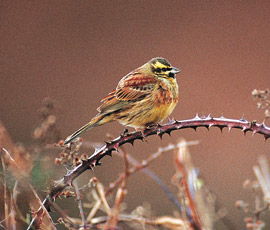Farmers urged to feed birds this winter

Farmland birds are facing winter food shortages because the wet summer weather has proved disastrous for hedgerow berries, fruit and grain supplies.
As a result, the Game and Wildlife Conservation Trust (GWCT) said the outlook for many bird species this winter was “extremely grim”.
“Last year our hedgerows and woods were full of nuts and berries, but this is not the case this winter,” said Peter Thompson, GWCT farmland biodiversity advisor.
“This means that there will not only be a very limited supply of food for our own native British birds, but also for the wide range of birds heading for our shores from Europe.”
And he warned: “If we have a prolonged cold winter with a lot of snow, many birds are destined not to survive.”
To make matters worse, farmers, who are paid under environmental stewardship schemes to grow wildlife seed mixtures to feed birds over winter, have had a bad harvest.
Farmers have been struggling to grow wild birdseed mixes and game cover crops this season, Mr Thompson said.
“The continual rain during the growing season has meant that germination was poor and in many instances farmers have had to re-sow crops numerous times,” he explained.
“This year, it will be even more important for farmers to offer additional food during this critical time of year.”
Peter Thompson
“The situation has been made even worse by the massive population explosion of slugs, which have revelled in the damp conditions. Munching their way through meagre crops, these voracious molluscs have rendered many hectares of wildlife crops barren.”
However, research by the GWCT has shown that farmland bird numbers such as yellowhammer were doubled in years when additional grain seeds were provided in feed hoppers during the leanest months of winter.
From 1 January 2013, farmers can be paid to provide additional grain during the “hungry gap” for farmland birds from January to late March.
“This year, it will be even more important for farmers to offer additional food during this critical time of year,” said Mr Thompson.
“This will ensure that many more birds will survive the winter and breed successfully next summer.”
Natural England said all farmers in environmental stewardship agreements that have elected to leave extended overwintered stubbles (EF22) or wild bird seed mixture (EF2) could change their agreement in 2013 to include an option for supplementary feeding of farmland birds (EF23).
ELS overhaul: New rules, new points
Winter food sources help attract farmland birds
Farmers could be paid to feed birds

